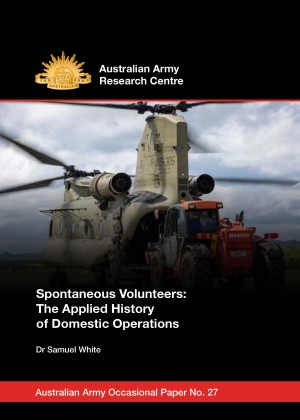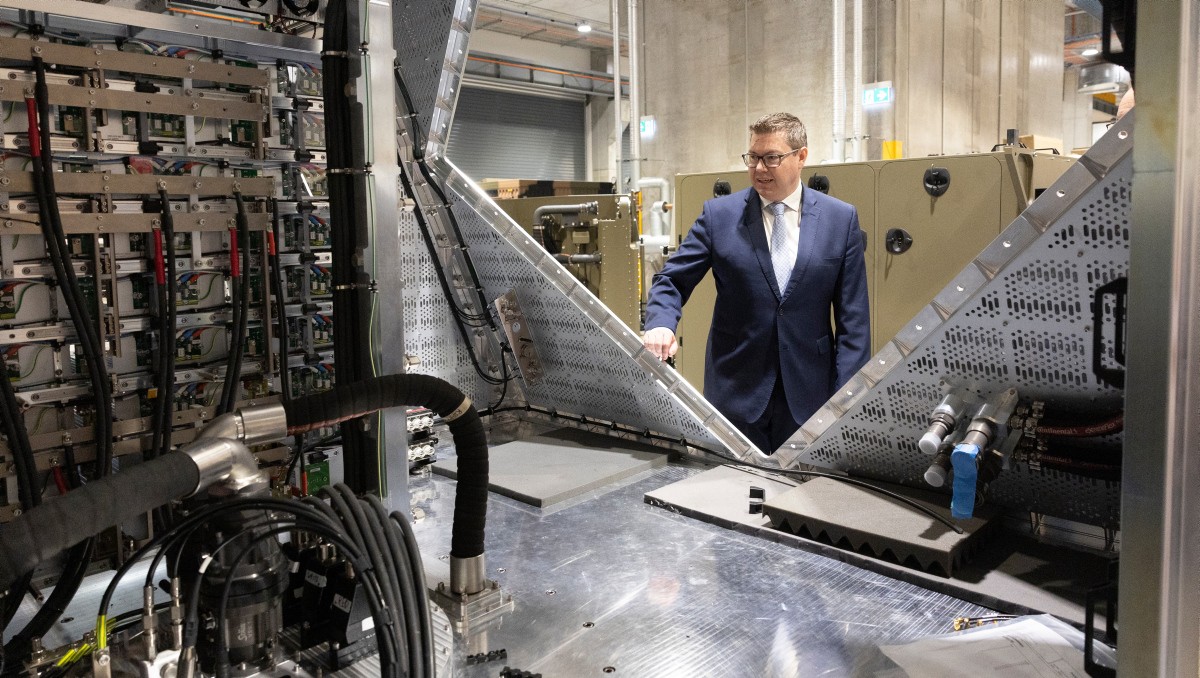Promotion of Occasional Paper 27 - Spontaneous Volunteers
The Australian Defence Force (ADF) has been traditionally been viewed as a predominantly military institution focused on conventional warfighting. However, over the past few decades, this perception has broadened significantly. The ADF's remit now includes a variety of non-military tasks, such as disaster relief and support during public health emergencies. These activities have highlighted the inadequacies in our existing legal and policy frameworks, particularly the ambiguous term "domestic violence" in Part IIIAAA of the Defence Act 1903. This term governs the deployment of federal troops within Australia and remains poorly defined, leading to operational uncertainties and legal ambiguities. Even more opaque is what the ADF can do on below that threshold on Australian soil, outside of Part IIIAAA.
Understanding the full scope of the ADF’s domestic role necessitates a comprehensive examination of historical and current military deployments. Over the past 6 years, I have done that. This interest started whilst I was posted as a legal staff officer within the Directorate of Operations and International Law (DOIL) in Canberra, during Operation Bushfire Assist and Operation COVID-19 Assist. For two years, interesting tactical, operational and strategic questions would arise in the workplace concerning the left and right of arc for the ADF’s deployment on domestic operations. The legal position was, at times, incredibly unclear. To try answer the question, I completed PhD on the topic. This Occasional Paper draws upon the 6 years of research I undertook in this endeavour.
Domestic deployments range from military assistance during natural disasters (such as the 1989 Newcastle earthquake) to providing logistical support during the COVID-19 pandemic. My research investigates these instances to draw insights and to propose necessary policy changes that align with the ADF’s evolving role in domestic operations. The current policy does not just reflect the law – which is fine (often policy is more restrictive than full legal authorities). The difficulty with domestic operations is that the policy is often treated as the law. It is not.
The Legal and Policy Framework: Inadequacies and Ambiguities
The legal and policy frameworks governing the ADF's involvement in domestic operations are primarily categorised as either Defence Assistance to the Civil Community (DACC) or Defence Aid to the Civil Authority (DFACA). DACC operations are non-coercive and involve providing aid during natural disasters or public health emergencies. For example, ADF personnel might help evacuate residents, deliver supplies, or restore essential services in the aftermath of a disaster. On the other hand, if there is any use of force, under policy the activity must be categorised as a DFACA operation. This spans low level civil disturbances, all the way through to calling out specialised units under Part IIIAAA.
However, the distinction between DACC and DFACA is not always clear-cut. The use of the word "force" within DFACA policy is broad and can include actions that restrict movement or impose other limitations, regardless of physical contact. This ambiguity has led to operational and legal challenges, as seen during the COVID-19 pandemic when ADF personnel were involved in enforcing quarantine measures and assisting at border checkpoints. Does the presence of troops on the border constitute force? Would flying a drone over Melbourne, identifying individuals more than 5km from their home, constitute force? Could hotel quarantines have been more readily enforced if ADF members operated as ‘spontaneous volunteers’ rather than having to wait for police direction?
Applying history, and in particular military / legal history, we can see that the three examples above are not only legal, but have occurred in analogous operations in Australian history. These operations are not only constitutionally valid, but are constitutionally designed and intended. The binary framework of DACC and DFACA is increasingly outdated, failing to address the complexities and nuances of contemporary domestic crises.
My paper argues for a redefinition of these categories to better reflect the current and future roles of the ADF. A more nuanced approach is needed, one that considers the varied nature of domestic emergencies and the specific contributions the ADF can make without overstepping its mandate or creating legal uncertainties.
To understand the current challenges and opportunities in redefining the ADF's domestic role, it is essential to look at historical precedents. Since Federation in 1901, the ADF has been called upon for various domestic operations, often in ways that challenge the legal frameworks in place. One significant example is the ADF’s response to Cyclone Tracy in 1974. The cyclone devastated Darwin, leading to a massive evacuation and reconstruction effort. It also required military troops to patrol Darwin, to ensure order and stop looting. This was done under authority of a military commanding officer and was not the first time this sort of operation has occurred in Darwin. The ADF was integral in providing immediate relief, medical assistance, and the rebuilding of critical infrastructure.
The paper outlines another 16 examples of domestic operations since 1901 that have tested the boundaries of defence policy and public perceptions as to the appropriate role of the ADF. These historical examples have helped identify the relevant legal boundaries and reveal that the ADF's domestic role is not a new phenomenon. It has evolved in response to changing national needs. The case studies also illustrate the necessity of a more flexible and comprehensive policy approach that can accommodate the diverse nature of domestic emergencies.
Proposing a New Policy Framework
In light of these insights, my paper proposes a ‘new’ policy framework that reflects the evolving role of the ADF in domestic operations. I hesitate to say new, because in reality it reflects the existing policy that governs use of the British military in its domestic operations – a safe bet, as we have the same legal frameworks. The proposed policy shifts away from DACC/DFACA towards one that frames the appropriateness of domestic ADF operations with reference to whether they involve ‘military work.’ The paper contends that this approach would provide clearer guidelines for when and how the ADF can be deployed within Australia, ensuring that its use is both appropriate and effective.
The new framework would advocate for a broader integration of the ADF into domestic emergency planning and response. This would include regular training and joint exercises with civilian agencies to enhance preparedness and ensure that the ADF can be quickly mobilised when needed. It would also involve leveraging the ADF's unique capabilities, such as logistics, medical support, and engineering, to bolster national resilience.
Finally, the framework would emphasise the importance of legal and ethical considerations in domestic ADF operations. These include safeguarding civil liberties, maintaining transparency and accountability, and ensuring that the ADF's involvement is always in line with democratic principles and the rule of law.
Conclusion: Towards a Future-Proof ADF
The ADF's role within Australia is a dynamic and crucial aspect of our national security and emergency response capabilities. By learning from our history and addressing the current policy gaps, we can better prepare the ADF to meet future challenges. My paper aims to provide a foundation for ongoing discussions and reforms, ensuring that the ADF remains a vital and effective part of Australia's domestic operations.
In conclusion, "Spontaneous Volunteers" not only documents the historical use of the ADF in domestic operations but also advocates for a reimagined policy framework. This framework would better align with contemporary needs and the expectations of the Australian public, ultimately enhancing our national resilience and security. By embracing a more flexible and comprehensive approach, we can ensure that the ADF continues to serve and protect Australians in times of need, both at home and abroad.
The views expressed in this article and subsequent comments are those of the author(s) and do not necessarily reflect the official policy or position of the Australian Army, the Department of Defence or the Australian Government.
Using the Contribute page you can either submit an article in response to this or register/login to make comments.



